The Rise of Islamic State: Isis and the New Sunni Revolution by Patrick Cockburn, book review
Why the West is to blame for the advance of Isis

Your support helps us to tell the story
From reproductive rights to climate change to Big Tech, The Independent is on the ground when the story is developing. Whether it's investigating the financials of Elon Musk's pro-Trump PAC or producing our latest documentary, 'The A Word', which shines a light on the American women fighting for reproductive rights, we know how important it is to parse out the facts from the messaging.
At such a critical moment in US history, we need reporters on the ground. Your donation allows us to keep sending journalists to speak to both sides of the story.
The Independent is trusted by Americans across the entire political spectrum. And unlike many other quality news outlets, we choose not to lock Americans out of our reporting and analysis with paywalls. We believe quality journalism should be available to everyone, paid for by those who can afford it.
Your support makes all the difference.The recent public butchering of 21 Egyptian Copts on a Libyan beach, followed by Cairo's swift bombing reprisals, have drawn attention to the continued expansion of Islamic State (or Isis). No longer confined to Syria and Iraq, US intelligence said earlier this month that it has a growing international footprint, with franchises not just in Libya, but also in Afghanistan, Algeria and Egypt.
In his new book, Patrick Cockburn examines the roots and repercussions of a movement that was little known before its stunning blitzkrieg through Iraq in the summer of 2014, climaxing in the capture of the country's second biggest city, Mosul.
It is a profoundly bleak analysis. Isis and its redrawing of the map of the Middle East are almost certainly here to stay. In Syria, where Isis started out, there is little hope for an early end to the civil war because of the multiplicity of players and outside interests. The days of Iraq as a unitary state may also be over. Its disintegration into separate Shia, Sunni and Kurdish regions cannot now be undone, Cockburn believes
How did things get so bad? One reason is the political and economic marginalisation of Sunnis by Iraq's Shia-dominated government. Its rule, says Cockburn, is as sectarian, corrupt, dysfunctional and even brutal as Saddam Hussein's ever was. Life in the Isis-declared caliphate is also no picnic, of course. Cockburn doesn't explore the millenarian ideology of Isis, or the brutality of its rule, but he makes clear that even Sunnis who don't like it are fearful of the return of a vengeful Shia-led government.
There are some recent glimmers of hope. The beating back of Isis from Kobani on Syria's border with Turkey undermined its aura of invincibility. There are signs, too, that US airstrikes are having some effect. An estimated 6,000 fighters have been killed since they began last August, the US says. Meanwhile, a major sponsor of jihadi activity in the region, Saudi Arabia, has shown signs of re-thinking its position.
Saudi Arabia and other Gulf states, bent on toppling Syria's President Assad, were instrumental in creating the conditions for the rise of Isis. But Cockburn also sees US policy since 9/11 as profoundly misguided, arguing that little progress will be made against the growth of jihadi movements until the US recognises its allies Saudi Arabia and Pakistan as the key states in promoting Islamic extremism. The problem being, of course, that not even Washington can ignore the admonition to "keep ahold of nurse for fear of finding something worse".
Join our commenting forum
Join thought-provoking conversations, follow other Independent readers and see their replies
Comments